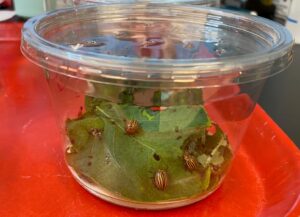Agriculture
December 17, 2024—Beginning in 2019, the Wells Fargo Innovation Incubator (IN2) partnered with the Donald Danforth Plant Science Center in St. Louis, Missouri on a series of cohorts focused on sustainable agriculture technologies. For the 10th anniversary of IN2, the program is checking in on the participants of the first cohort of the agtech program.
For decades, farmers relied on blanket pesticides to protect crops from insects and fungal infections. But these broad-spectrum chemicals come with unintended risks—killing beneficial insects, contributing to pesticide-resistance species, and raising health concerns for consumers. Today, RNAissance AG offers a smarter solution.
“We created a natural biopesticide that only kills the targeted species,” said Steve Meyer, CEO of RNAissance AG. “It doesn’t harm non-target organisms because we engineer a specific RNA sequence for selectivity. And we’re doing it at a cost that’s affordable for budget-conscious growers.”

Colorado potato beetles feed on leaves treated with RNAissance AG’s biopesticide spray, unknowingly ingesting RNA designed to disrupt their survival. Photo courtesy of RNAissance AG
RNAissance AG’s biopesticide is a spray applied directly to plants. When a pest consumes the treated leaves, it ingests the RNA designed to kill the insect. The first targeted product of this technology is the Colorado potato beetle.
“The beetles stop feeding on the treated plant and eventually die because the RNA disrupts essential functions they need to survive,” Meyer said. “But beneficial insects, like bees, remained unharmed.”
The biopesticide is designed to be short-lived, lasting only five to seven days once sprayed in the environment. Once ingested, it breaks down into smaller fragments that do the work inside the insect. Anything not digested degrades quickly due to sunlight and environmental microbes. RNAissance AG had to balance making a product that lasts long enough to be effective, but not so long that it harms the environment.
“You don’t want to protect the biopesticide to the point where it lingers for months,” Meyer said. “Formulation is key—it’s like applying sunscreen to the plant or packaging it so it’s shielded from microbial enzymes, yet still accessible to the target organisms.”
As the potato beetle biopesticide moves toward market release, RNAissance AG is already developing new compounds to combat fungal infections in plants.
“We’re progressing from lab tests to pilots to commercial scale,” Meyer said. “Our goal is to bring these technologies to market and truly make an impact.”
RNAissance AG was founded by Danforth Center Senior Research Scientist Bala Venkata, PhD, who developed the technology using RNAi (“I” for interference) technology that is not new, but what is new is the company’s discovery of novel mechanisms to target lepidoptera pests on a wide range of crops. The biological specificity comes from small RNA molecules that are designed to target insect pests in precise interactions when ingested. The startup received support from TechAccel Partners, a private equity firm and was still in its early stages when it joined IN2. Through IN2, Bala worked with Noah Fahlgren, Ph.D., director of Danforth Center’s Data Science Facility, to validate the RNAissance AG technology. The program’s funding and guidance were instrumental in advancing its research and development efforts.
“IN2 helped our team understand the process and refine the experiments in our pipeline,” Meyer said. “The funding accelerated our business plan by supporting both the pipeline and R&D efforts. Companies often fail due to a lack of funding, not technical success. IN2 gives you that extra gas in the tank, which is crucial.”
Meyer joined RNAissance AG two years ago, driven by a clear vision to advance the company’s innovative biopesticides.
“I saw this unique opportunity to take this technology, de-risk it, and bring it to market,” he said. “I’m passionate about bridging the gap between science and business.”
Now, as RNAissance AG collaborates with partners on licensing and expansion, the company is poised to demonstrate that smarter, targeted solutions can effectively protect crops without the downsides of traditional pesticides.
